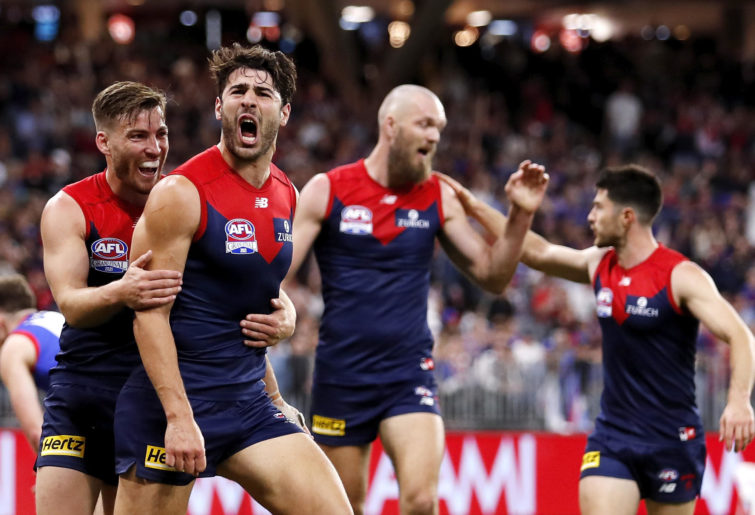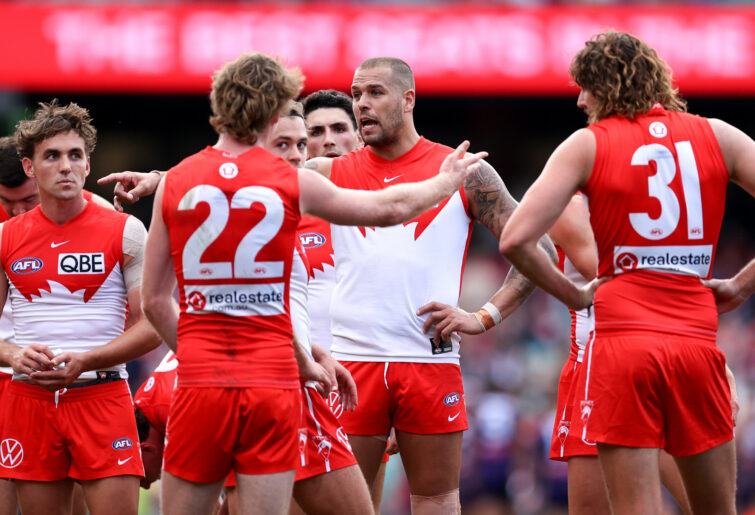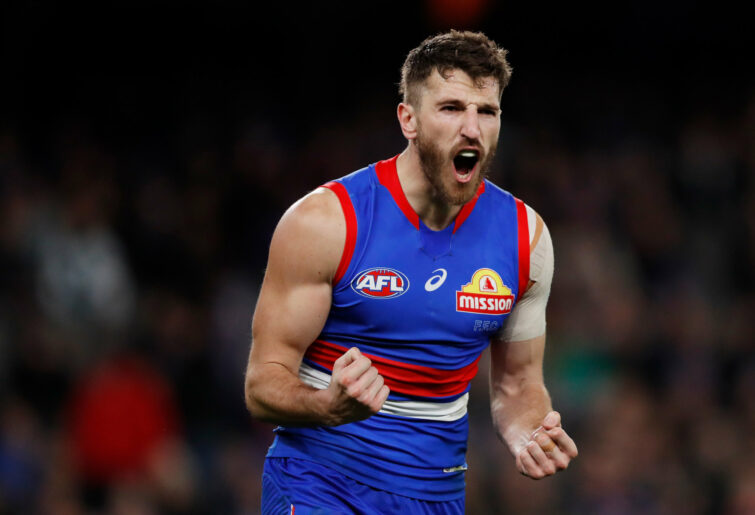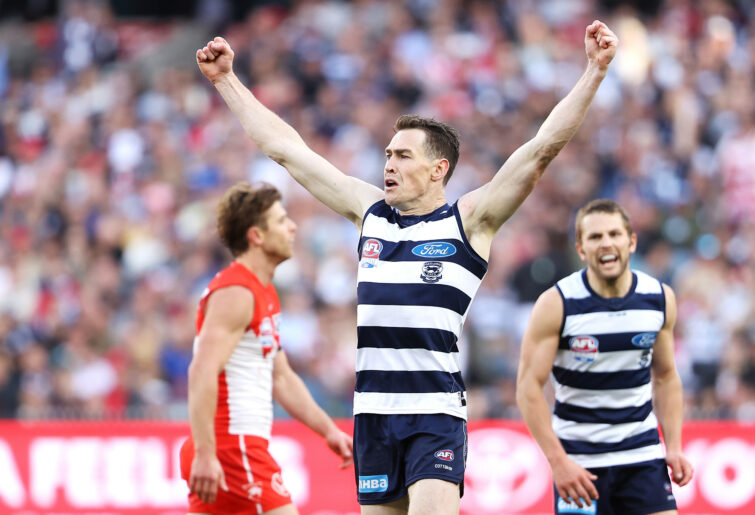Mr Arbiter Sir
new author
Roar Rookie
Opinion
Since the inception of the AFL in 1990 there has been furious debate over the location of where the grand final is hosted.
Competition traditionalists argue that it always has and always should be hosted at the MCG as per history and tradition while others suggest that the grand final should be hosted at the home ground of the team that finishes highest on the ladder earning them the “home” fixture.
The main reason for this opposing argument is the consensus that tenant teams to the MCG have an unfair advantage playing teams that are not tenants, especially those teams who reside interstate.
These tenant teams are Richmond, Hawthorn, Collingwood, and Melbourne with partial tenancies handed to Essendon and Carlton, who split their tenancy with Marvel Stadium, and Geelong who split their tenancy with GMHBA.
It is also worth highlighting that prior to the construction of Marvel Stadium as it’s known now and the eventual demise of Waverly Park, North Melbourne called the MCG home until 2005, Hawthorn only became an MCG tenant in 2000.
The Western Bulldogs nor St Kilda have called the MCG home since 1990.
With the inception of a 19th and eventually a 20th team in the foreseeable future, there will be an even number of teams based in Victoria and those based interstate. But does hosting the grand final every year at the MCG really provide an advantage for tenant teams and Victorian-based teams in general?
I’ve looked at the stats, the numbers and the circumstances behind the winning and losing teams of every grand final since 1990 and the results might actually surprise you.
The MCG has been the home of the VFL/AFL grand final since 1902 with a few exceptions. The two most notable of these exceptions are the ones in our most recent memory. 2020 and 2021 due to COVID-19 lockdowns closing state borders in Australia.
These two grand final played in Queensland and Western Australia respectively have been the only two in AFL history to be played outside of Victoria.
To the dire of fans who support interstate teams, in 2018 the AFL locked in the MCG as the home of the grand final until 2057 – for another 34 years from now. The grand final isn’t moving from the MCG any time soon but having the grand final at what is considered to be one of the greatest stadiums in the world doesn’t provide teams the advantage that people claim it does.
Breaking down the stats since 1990 to their bare numbers, we can observe the following.
Grand finals won by:
MCG Tenant teams – 19
Carlton (‘95)
Collingwood (‘90, ‘10)
Essendon (‘93, ‘00)
Geelong (‘07, ‘09, ‘11, ‘22)
Hawthorn (‘08, ‘13, ‘14, ‘15)
Melbourne (‘21)
North Melbourne (‘96, ‘99)
Richmond (‘17, ‘19, ‘20)
Victorian non-tenant teams – 2
Hawthorn (‘91)
Western Bulldogs (‘16)
Interstate teams – 12
Adelaide (‘97, ‘98)
Brisbane (‘01, ‘02, ‘03)
Port Adelaide (‘04)
Sydney (‘05, ‘12)
West Coast (‘92, ‘94, ‘06, ‘18)
On the basis of these numbers at face value, it does seem very lop-sided but there are a lot of other things worth considering when breaking down this argument when trying to prove or disprove the home ground/state advantage.
The first one is who the opponents were during these grand finals.
The following is a list of grand finals won by MCG tenant teams against non-tenant teams:
1996 – North Melbourne defeating Sydney by 43 points
2007 – Geelong defeating Port Adelaide by 119 points
2009 – Geelong defeating St Kilda by 12 points
2010 – Collingwood defeating St Kilda by 56 points (one week after the draw)
2013 – Hawthorn defeating Fremantle by 15 points
2014 – Hawthorn defeating Sydney by 63 points
2015 – Hawthorn defeating West Coast by 46 points
2017 – Richmond defeating Adelaide by 47 points
2019 – Richmond defeating GWS by 89 points
2021 – Melbourne defeating Western Bulldogs by 74 points
2022 – Geelong defeating Sydney by 71 points
The 2021 premiership victory by Melbourne was not played at the MCG due to COVID-19 so can be omitted from this argument. This leaves 10 premierships won by MCG tenants against nontenant teams, with 8 of those victories occurring against interstate teams.
Next, let’s look at the other side of the equation.
The following is a list of Grand Finals won by interstate teams against MCG tenant teams:
1992 – West Coast defeated Geelong by 28 points
1994 – West Coast defeated Geelong by 80 points
1998 – Adelaide defeated North Melbourne by 35 points
2001 – Brisbane defeated Essendon by 26 points
2002 – Brisbane defeated Collingwood by 9 points
2003 – Brisbane defeated Collingwood by 50 points
2012 – Sydney defeated Hawthorn by 10 points
2018 – West Coast defeated Collingwood by 5 points
There is one premiership won by an interstate team against a Victorian team that is not a tenant of the MCG and that was the 1997 victory by Adelaide over St Kilda so it is not counted in this argument.
That leaves 10 premierships won by MCG tenants at the MCG against non-tenant teams, 8 of those occurring against interstate teams. On the contrary, 8 premierships won by interstate teams at the MCG occurred against MCG tenant teams.
The split is an even 50% either way for MCG tenants and interstate teams which seems to break down the “home-ground advantage” on Grand Final nearly instantly.
I can further argue that there are a lot of significantly more impactful factors that have led to MCG tenants and one non-tenant Victorian team defeating interstate opposition in grand finals held at the MCG that extend far beyond a home-state advantage.

(Photo by Dylan Burns/AFL Photos via Getty Images)
The 1996 victory by North Melbourne over Sydney was pre-shadowed by interruptions to Sydney’s match preparations where it eventually took a Supreme Court injunction to have a tribunal hearing delayed for a report on Sydney defender Andrew Dunkley for striking Essendon’s James Hird in the preliminary final.
Attending court hearings as well as the media intrusion hanging over the club at the time could be argued to have caused major distractions in Sydney’s preparation before the Grand Final in which Andrew Dunkley was considered the man to take on a red-hot Wayne Carey.
The 2007 victory by Geelong over Port Adelaide is to this day the highest ever winning margin in an AFL grand final. The first-placed Geelong finished 12 points over the second-placed Port Adelaide that season but question marks were raised on how Port Adelaide would perform if they were to make the grand final during the season after suffering losses to high pressure teams including losing to Adelaide twice and to Sydney during the season.
Geelong on the contrary was the highest-pressure team all year and many would make the argument that regardless of where the game was played it was going to result in a blowout.
The 2013 victory by Hawthorn over Fremantle is one of the few where a home-ground advantage could be argued due to the small margin and relative fitness of both teams on grand final day.
It is worth noting though that during that finals campaign, Fremantle managed to defeat Geelong in Geelong – the only team to do so that year. It was also the first and only time that Fremantle had made a grand final and the first half of football looked as if it was the pressure of the occasion and not the location that was the cause for Fremantle’s loss.
It was also the third premiership that coach Ross Lyon had lost, concerns raised prior to the grand final that his game style would not hold up in grand finals against high-scoring teams, something Hawthorn was renowned for by finishing the year on top of the ladder with a percentage of 135.72%. Hawthorn were simply the best team all year.
The 2014 victory by Hawthorn over Sydney couldn’t really be argued as being caused by a home advantage because Sydney had defeated Hawthorn in a grand final at the same ground just two years prior.

Lance Franklin of the Swans speaks to his teammates. (Photo by Brendon Thorne/AFL Photos/Getty Images)
This was Hawthorn’s third grand final in a row out of the eventual four in a row they would play and despite Sydney recruiting star forward Lance Franklin, the club was close to saying goodbye to some of their star players including Ryan O’Keefe who retired that year Adam Goodes, Mike Pyke and Rhys Shaw who all retired the year after.
The argument could be made that a hot-for-trot Hawthorn playing their third Grand Final in a row overcame what was simply an aging list.
The 2015 victory by Hawthorn over West Coast is likely the best contender for the argument of a home-ground advantage. In the first final of 2015, West Coast defeated Hawthorn convincingly in what was their home game played at Subiaco in Perth with a game style that had seen the Eagles finish second on the ladder, ahead of third-placed Hawthorn who boasted the highest points for and percentage during the home and away season.
In the lead-up to the grand final once West Coast and Hawthorn were locked in as the two teams to face off there was a lot of media questioning over whether Hawthorn coach Alastair Clarkson would be able to overcome the West Coast Eagles tactics that saw them defeated just a few weeks prior.
On the day, West Coast played the same tactics they had which brought them success all year but Hawthorn played a completely different style of football not seen by them all season.
Was it a home-ground advantage that led to Hawthorn’s victory or was it Alastair Clarkson providing a masterclass of coaching that led to West Coast’s defeat? This one will be up for debate until the end of time.
The 2016 victory by the Western Bulldogs over Sydney is infamous for a number of reasons. The season the Western Bulldogs finished in seventh place and Sydney on top is notable because only two victories split first and seventh at the end of the season.
During the finals campaign, the Western Bulldogs played some of their greatest games of football defeating West Coast in Perth, the reigning Triple-Premiers Hawthorn, and a very plucky GWS outfit before facing off against Sydney.
The grand final to this day is a hot topic of debate. Sydney suffered injuries early in the first quarter to both Lance Franklin who finished second in the Coleman medal by one goal and Daniel Hannebery who was arguably Sydney’s best midfielder at the time.
Both Franklin and Hannebery were listed in that season’s All-Australian on-field, with only two Western Bulldogs players scraping in on the All-Australian bench – Marcus Bontempelli and Matthew Boyd. Being two key players down for essentially three and a half quarters certainly impacted Sydney.

(Photo by Dylan Burns/AFL Photos via Getty Images)
It’s also a contentious grand final in terms of how it was officiated with the game eventually coming under review by the AFL for the seemingly lop-sided free kick count and unfair calls made against Sydney during the day, in which the AFL determined that the umpiring was not up to standard by the three field umpires officiating on the day.
At the time of the 2017 victory by Richmond over Adelaide, it could have been very well argued that Richmond won due to a home ground advantage, a season where they had played more games at the MCG than any other team. As would be later revealed though it was also the same year Adelaide played after the controversial pre-season camp that saw players psychologically tortured and the birth of the infamous “power stance”.
This camp led to players retiring early or leaving Adelaide outright with some seeking public apologies for damages from the club themselves. If this was hanging over the players all season as it did for seasons to come then you could easily draw a conclusion that this camp had a greater bearing on the eventual grand final defeat than the ground it was played at.
The 2019 grand final where Richmond defeated GWS was the second one Richmond played in three years. It was also the first time that GWS had ever made the big dance.
Richmond had been near the top of the competition for three years now only bowing out of the 2018 finals due to a freakish quarter of football by Collingwood’s Mason Cox.
Many would argue that had Richmond beaten Collingwood they would have won four premierships in a row being the team to beat for the entirety of the season.
Richmond finished equal first on the ladder that season, GWS finishing sixth. An experienced finals team was coming up against a team of kids and the inevitable happened. Much like the 2007 grand final, this result was almost guaranteed regardless of where the game was played.
The 2022 grand final was much like the 2019 one. Geelong was the team to beat all year, finishing outright first on the ladder with the highest percentage and the oldest/most experienced team in the competition. Sydney finishing third had fielded the youngest list of the Top 8 that season.

Jeremy Cameron of the Geelong Cats celebrates. (Photo by Mark Kolbe/AFL Photos/via Getty Images)
There was a lot of back and forth in the days leading up to the Grand Final on whether Sydney’s youth could outrun the significantly older Geelong team but by the end of it, it was the bigger, stronger bodies of the Geelong side that seemingly outbodied the youngsters at nearly every contest.
So, does the MCG actually provide an advantage to Victorian teams on grand final day? The trope that Victorian teams seem to have an advantage can be seemingly disproved just by the raw numbers with a 50% win/loss ratio by MCG tenants against interstate teams.
Furthermore, in the victories by MCG tenants for the majority of those games the team that was better throughout the entire season won.
Ultimately, the best team on the day is going to win. Nothing has ever been truer than that.